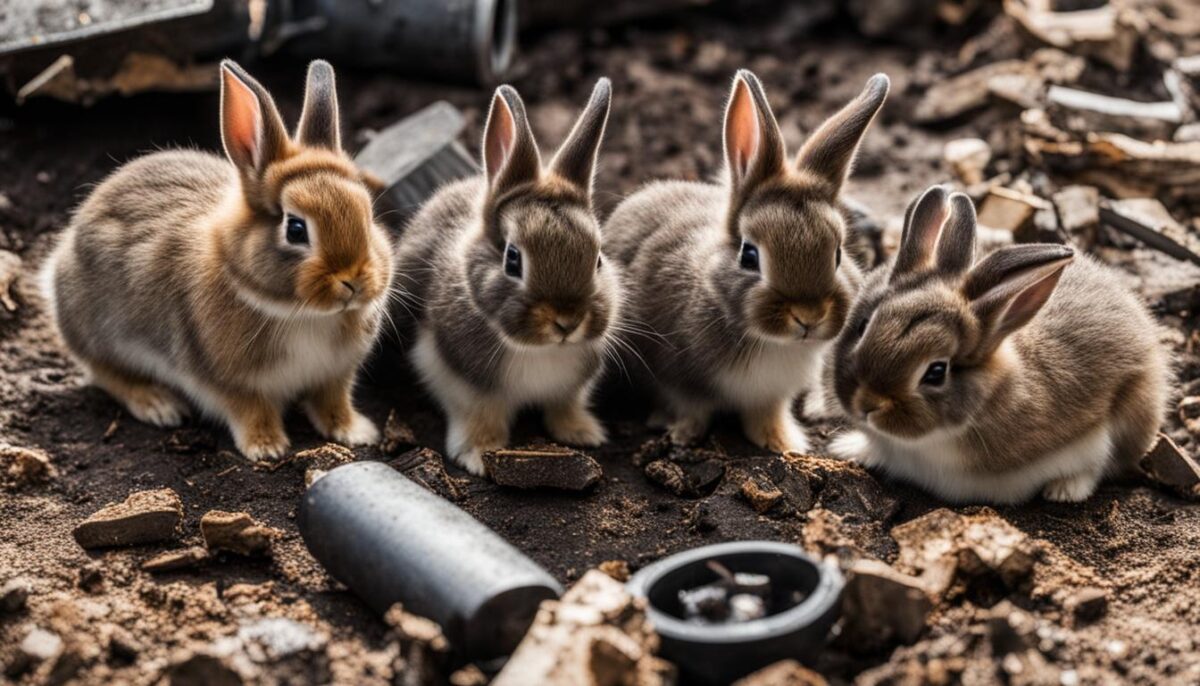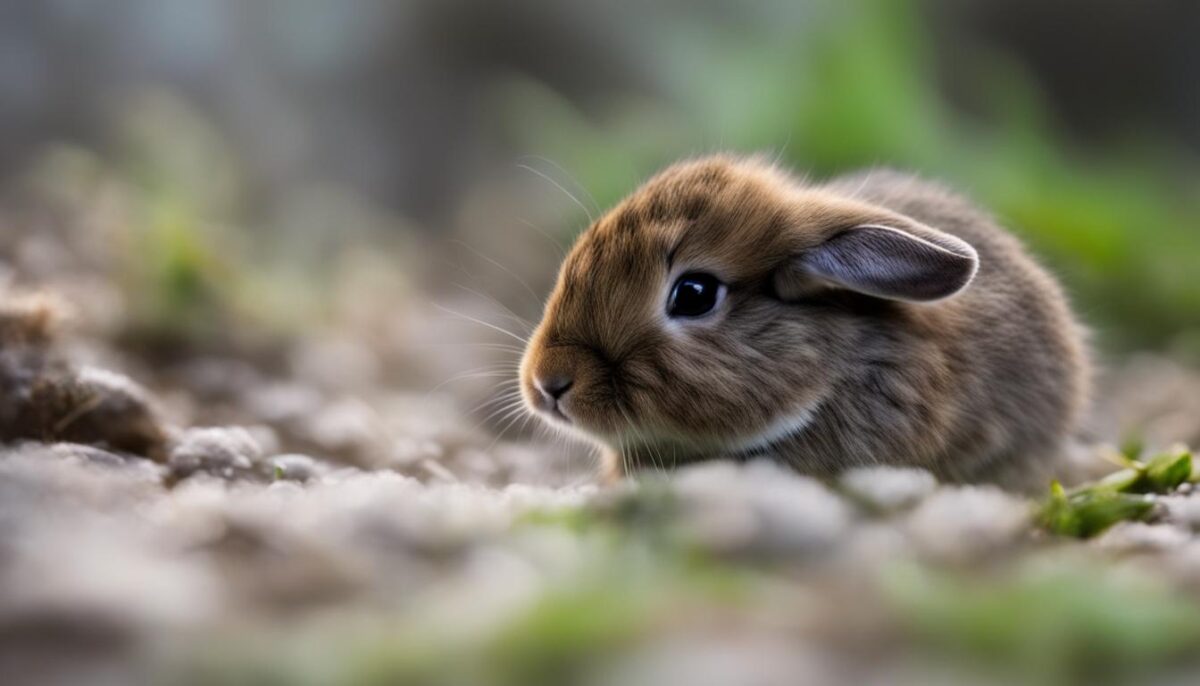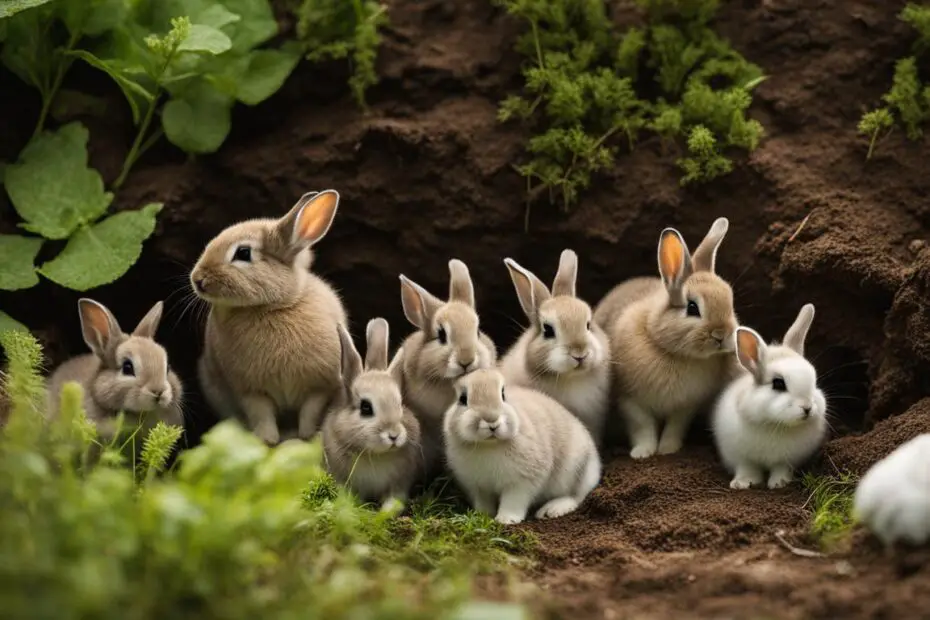Losing a much-loved pet bunny at any age can be distressing, but it is particularly frustrating when a baby bunny dies without an obvious reason. Premature death in rabbits is unfortunately common, with a majority of rabbits not living their full lifespan. A study of 100 case histories revealed that teeth problems and digestive upsets are the two major killers of rabbits that die prematurely. Other causes of baby bunny deaths include infections, respiratory issues, and accidents. Understanding these common causes can help prevent baby bunny deaths in the future.
Key Takeaways:
- Baby bunnies are prone to premature deaths, with teeth problems and digestive upsets being the main culprits.
- Infections, respiratory issues, and accidents are also common causes of baby bunny deaths.
- Proper care and preventive measures can significantly reduce the risk of losing baby bunnies prematurely.
- Regular veterinary visits, a balanced diet, proper hygiene, and a safe living environment are essential for the health and longevity of baby bunnies.
- Understanding the risks and taking preventative measures can enhance the well-being and lifespan of baby bunnies.
Dental Problems: A Major Cause of Baby Bunny Deaths
Dental issues, such as tooth overgrowth and malocclusion, are a significant cause of premature death in baby bunnies. Almost a quarter of the cases studied showed that rabbits were either put to sleep or died due to teeth-associated problems. These dental issues are often inherited and difficult to prevent or cure. Regular vet visits and a proper diet can help manage dental disease in baby bunnies, but they may not always be successful.
It is crucial to understand the importance of dental health in baby bunnies. Rabbits’ teeth continue to grow throughout their lives, and dental problems can arise if their teeth become overgrown or misaligned. Tooth overgrowth can lead to pain, difficulty eating, and even abscesses. Malocclusion, a condition where the teeth do not meet correctly, can cause similar issues.
Prevention and early detection are key when it comes to dental problems in baby bunnies. Providing appropriate chew toys, such as wooden blocks or hay, can help wear down their teeth naturally. Regular vet check-ups, including teeth examinations, can help identify any dental issues early on. If dental problems do arise, treatment options may include tooth trimming, extractions, or even specialized diets.
Digestive Upsets: A Common Killer of Baby Bunnies
Baby bunnies are susceptible to various digestive upsets that can have fatal consequences if not addressed promptly. One of the most prevalent digestive issues in baby rabbits is mucoid enteritis, a condition characterized by inflammation of the intestines. It often affects rabbits under 12 weeks of age and is a leading cause of death in young bunnies.
Certain factors contribute to the development of mucoid enteritis, including sudden changes in diet, exposure to stress, poor hygiene, and overcrowding. These can disrupt the delicate balance of bacteria in the gut, leading to inflammation and diarrhea. Additionally, baby bunnies can also experience diarrhea due to dietary indiscretion or infections.
Prevention plays a crucial role in avoiding digestive upsets in baby bunnies. Providing a proper diet rich in fiber, such as fresh grass hay and limited amounts of fresh vegetables, can aid in maintaining a healthy digestive system. Additionally, ensuring a clean living environment, minimizing stressors, and practicing good hygiene can reduce the risk of mucoid enteritis and other digestive issues.
| Signs of Digestive Upsets in Baby Bunnies: | Prevention Tips: |
|---|---|
| – Diarrhea | – Feed a high-fiber diet |
| – Loss of appetite | – Minimize diet changes |
| – Abdominal pain or bloating | – Provide a clean living environment |
| – Lethargy | – Reduce stressors |
| – Dehydration | – Practice good hygiene |
It is essential for rabbit owners to monitor their baby bunnies closely and seek veterinary care if any signs of digestive upsets are observed. With proper prevention and early intervention, the risk of fatalities due to digestive issues can be greatly reduced, ensuring the health and well-being of baby bunnies.
Other Health Issues Contributing to Baby Bunny Deaths
In addition to dental and digestive problems, baby bunnies can face various other health issues that can contribute to their premature deaths. These include central nervous system problems and respiratory infections. It is important for bunny owners to be aware of these potential health issues and take appropriate measures to prevent them.
Central nervous system problems, such as head tilt and E. cuniculi infection, were identified in around 10% of the baby bunny death cases studied. These conditions can cause neurological symptoms and can be challenging to treat. Regular veterinary check-ups and prompt interventions are vital in managing these health issues and minimizing their impact on the baby bunnies.
Respiratory infections are also a significant concern for baby bunnies. Pneumonia and other respiratory illnesses can be caused by bacterial or viral infections and can rapidly deteriorate the health of young rabbits. Maintaining a clean and well-ventilated environment, minimizing exposure to potential pathogens, and seeking veterinary care at the first signs of illness can help prevent respiratory infections and improve the chances of survival for baby bunnies.
| Health Issue | Percentage of Cases |
|---|---|
| Central Nervous System Problems | 10% |
| Respiratory Infections | 15% |
| Dental Problems | 25% |
| Digestive Upsets | 35% |
| Other Causes | 15% |
By being aware of these other health issues and taking proactive measures, bunny owners can create a safer and healthier environment for their baby bunnies. Regular veterinary care, maintaining proper hygiene, and providing a balanced diet can go a long way in preventing these health issues and ensuring the well-being of baby bunnies.
Environmental Factors and Accidents
When it comes to baby bunnies, environmental factors and accidents can play a significant role in their well-being and survival. Inappropriate temperatures can pose a serious threat to these fragile creatures. Baby bunnies are highly sensitive to cold temperatures and can quickly develop hypothermia if exposed to chilly conditions. On the other hand, overheating can also be detrimental to their health, leading to heat exhaustion and potentially fatal consequences. It is crucial to provide a suitable and controlled environment for baby bunnies, ensuring they are neither too hot nor too cold.
In addition to temperature-related concerns, accidents can also be a cause for worry when raising baby bunnies. They are naturally curious and can easily get themselves into trouble. Injuries, such as falls or getting caught in wire mesh, can be life-threatening for these delicate creatures. It is important to create a safe space for baby bunnies, free from potential hazards. Regularly inspect their living area and remove any objects or substances that could be harmful. Additionally, accidental poisoning can occur if baby bunnies ingest toxic plants or substances. Being mindful of their surroundings and taking necessary precautions can help prevent accidents and ensure the well-being of these adorable creatures.
Key Takeaways:
- Temperature regulation is crucial for baby bunnies, as they are vulnerable to both cold temperatures and overheating.
- Accidents can pose a serious threat to the safety of baby bunnies, including injuries and accidental poisoning.
- Creating a suitable environment and removing potential hazards are essential in preventing accidents and ensuring the well-being of baby bunnies.
| Environmental Factors and Accidents | Impact on Baby Bunnies |
|---|---|
| Cold temperatures | Can lead to hypothermia |
| Overheating | Can cause heat exhaustion |
| Accidents and injuries | Can result in life-threatening situations |
| Accidental poisoning | Can occur if baby bunnies ingest toxic substances |
Ensuring a suitable temperature and creating a safe environment for baby bunnies are crucial in their overall well-being and survival. By being mindful of these environmental factors and taking necessary precautions, we can provide a safe and nurturing space for these adorable creatures to thrive.

Mother-related Factors: a Role in Baby Bunny Deaths
The behavior and health of the mother rabbit play a significant role in the survival of baby bunnies. One common factor is the abandonment of baby bunnies by the mother rabbit. This often occurs due to stress or fright, and it can lead to starvation and ultimately death for the baby bunnies. It is important to create a calm and stress-free environment for the mother rabbit to reduce the risk of abandonment.
Young or inexperienced does may also have lower survival rates for their offspring. They may struggle with caring for their young or have difficulty producing enough milk. Providing support and guidance to young or inexperienced does can help improve the survival rates of their babies.
Large litter sizes can also contribute to higher baby bunny mortality rates. In larger litters, some kits may not receive enough attention or milk from the mother rabbit. It is essential to monitor the litter closely and provide supplemental feeding if necessary to improve the chances of survival for all the baby bunnies.
By being aware of these mother-related factors and taking appropriate measures to reduce stress, support young does, and ensure proper care for large litters, rabbit owners can help increase the chances of survival for baby bunnies and minimize the risk of premature death.
Parasites and Infections
Parasites and infections are common culprits behind the health issues and deaths of baby bunnies. One such parasite is coccidia, which can affect the digestive system of rabbits, including baby bunnies. Coccidia is often contracted through contaminated food or water, making hygiene practices crucial in preventing its spread. Regular veterinary check-ups can help detect and manage coccidia infections in baby bunnies.
Bacterial infections are another concern for baby bunnies, as they can lead to severe illness and even death if left untreated. Staphylococcosis and respiratory infections are among the bacterial infections that can affect young rabbits. These infections can be transmitted from the mother to her babies, emphasizing the importance of maintaining good hygiene and ensuring proper veterinary care for both the mother and the babies.
Parasites like coccidia and bacterial infections pose significant risks to the health and well-being of baby bunnies. By practicing good hygiene and providing regular veterinary care, rabbit owners can help prevent and manage these parasitic and infectious diseases, contributing to the overall health and longevity of their baby bunnies.
| Parasites in Baby Bunnies | Coccidia in Rabbits | Bacterial Infections in Baby Bunnies |
|---|---|---|
| Common cause of health issues and death | Contracted through contaminated food or water | Can lead to severe illness if left untreated |
| Hygiene practices crucial in prevention | Regular veterinary check-ups for detection and management | Transmission can occur from mother to babies |
| Emphasizes the importance of hygiene and veterinary care |

Prevention Tips for Raising Healthy Baby Bunnies
Raising baby bunnies requires careful attention and proper care to ensure their health and well-being. By following these essential tips, you can significantly reduce the risk of baby bunny deaths and promote their longevity.
Providing a Suitable Living Environment
Creating a suitable living environment is crucial for the health and safety of baby bunnies. Ensure they have a spacious and secure enclosure that allows them to move freely. A clean and comfortable bedding material, such as hay or straw, should be provided. Avoid using cedar or pine shavings, as they can be harmful to rabbits’ respiratory systems.
It’s also essential to provide a temperature-controlled environment. Baby bunnies are sensitive to extreme temperatures, so maintain a comfortable range between 60-70°F (15-21°C). Avoid exposing them to direct sunlight or drafts, as these can cause heatstroke or hypothermia.
Feeding a Proper Diet Gradually
A proper diet is vital for the healthy development of baby bunnies. Start by offering a high-quality commercial rabbit pellet that is specifically formulated for young rabbits. Gradually introduce fresh vegetables, such as leafy greens and carrots, into their diet. Ensure they have access to fresh hay at all times, which aids in digestion and dental health.
It’s important to avoid sudden changes in diet, as this can lead to digestive upsets. Introduce new foods slowly and monitor their response. Additionally, provide fresh, clean water in a sipper bottle or shallow bowl to keep them hydrated.
Considering Vaccinations and Neutering
Consult with a veterinarian about the appropriate vaccinations for your baby bunnies. Vaccinations can help protect them from common diseases and infections, providing an added layer of protection for their health.
Neutering or spaying your baby bunnies is also recommended. This not only prevents unwanted pregnancies but also reduces the risk of certain health issues, such as reproductive cancers. Consult with a veterinarian to discuss the best time and method for this procedure.
By following these prevention tips and providing proper care, you can raise healthy baby bunnies and ensure their well-being. Remember to monitor their behavior, pay attention to any signs of distress or illness, and seek veterinary care when necessary. With the right care and attention, you can enjoy a long and happy life with your adorable furry companions.
Conclusion
Baby bunny mortality rates are often influenced by various factors, including dental problems, digestive upsets, infections, environmental hazards, accidents, and mother-related issues. Understanding these common causes is vital in preventing premature deaths and providing better care for baby bunnies.
To ensure the well-being and longevity of these adorable pets, it is crucial to prioritize proper baby bunny care. This includes providing them with a suitable living environment, gradually introducing a nutritious diet, ensuring access to fresh hay and water, and considering vaccinations and neutering. By taking these preventative measures, rabbit owners can significantly reduce the risk of baby bunny deaths.
It is essential to remain vigilant and monitor the health of baby bunnies closely. Regular veterinary check-ups and prompt interventions can help identify and manage potential health issues before they become life-threatening. Additionally, pet insurance can provide financial support for unexpected veterinary expenses, ensuring that baby bunnies receive the necessary care when needed.
By being well-informed about the risks and actively implementing preventive measures, we can create a safer and healthier environment for baby bunnies. With the right care and attention, these adorable creatures can thrive and bring joy to our lives for many years to come.
FAQ
What are the common causes of premature death in baby bunnies?
The common causes of premature death in baby bunnies include dental issues, digestive upsets, infections, respiratory issues, accidents, and mother-related factors.
How can dental problems affect baby bunnies?
Dental problems, such as tooth overgrowth and malocclusion, can lead to significant health issues and even death in baby bunnies.
What are some digestive upsets that can be fatal for baby bunnies?
Mucoid enteritis and diarrhoea are common digestive upsets that can be extremely serious and fatal for baby bunnies.
What other health issues can contribute to baby bunny deaths?
Other health issues that can contribute to baby bunny deaths include central nervous system problems, respiratory infections, cancer, and sudden death without symptoms.
How can environmental factors and accidents impact baby bunnies?
Cold temperatures, overheating, accidents, injuries, escape, and accidental poisoning can all lead to the death of baby bunnies.
How does the behavior and health of the mother rabbit affect baby bunny deaths?
The abandonment of baby bunnies by the mother, young or inexperienced does, and large litter sizes can all contribute to higher mortality rates among baby bunnies.
What are some parasitic and infectious diseases that can affect baby bunnies?
Baby bunnies are vulnerable to parasites like coccidia and bacterial infections, which can be transmitted from the mother to the babies.
What are some prevention tips for raising healthy baby bunnies?
Providing a suitable living environment, feeding a proper diet, ensuring good hygiene, and seeking regular veterinary care are important in raising healthy baby bunnies.
How can I prevent baby bunny deaths?
By understanding the common causes of premature death in baby bunnies and following proper care guidelines, you can help prevent baby bunny deaths and enhance their overall well-being and longevity.


